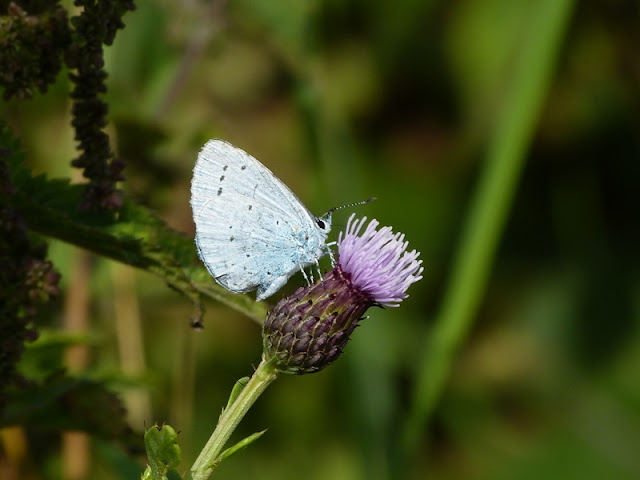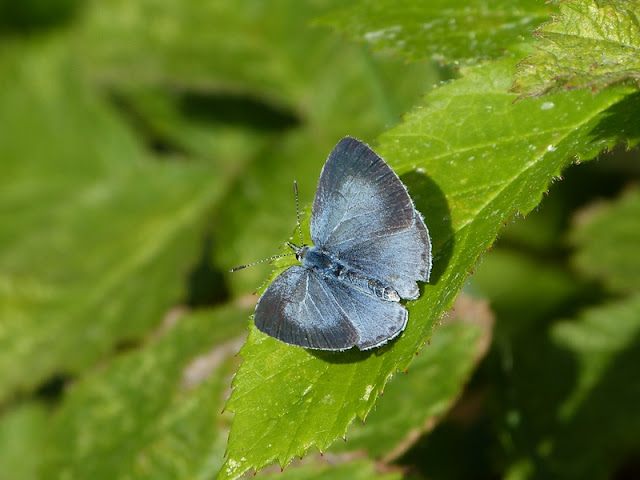This beautiful little butterfly is found extensively across
England and Wales but there is only the odd record in Scotland. Most of those
are from East Lothian, although they have been recorded in Fife and the
Scottish Borders.
I was always aware of a colony on the western edge of East
Lothian, but when I checked out Butterfly Conservation’s records for the area,
I only found one record from 2013, although I know they had been seen there for
many years before that. It just shows the importance of making sure that
sightings of any butterflies are sent to the local recorder. Sadly, following a
series of cold winters that colony appeared to die out.
For the last ten years, though, there have been single
sightings each year from an area around three villages in the north of East
Lothian. These have all been from Dirleton, North Berwick and Gullane and I
suspect that there is a large private garden somewhere in that area containing
Holly and Ivy where a colony of Holly Blues has secretly been living. Those
individuals that were seen could all have flown from that one colony.
Despite the efforts of a few of us, we have never found
where that colony may have been.
In 2011 there was great excitement, as three Holly Blues
were seen on the outskirts of Aberlady. However, despite careful checking of
the area since, they were not seen there again.
Then in 2019 some Holly Blues were seen feeding on Snowberry
flowers on the outskirts of Gullane, right next to a popular path. I am sure
that they would have been spotted in previous years if they had been there. I
think the maximum count seen then was 7 butterflies.
A little later in the year a second colony was found a few
hundred yards away and a couple of individuals were spotted on the outskirts of
the village.
In 2020 we anticipated their return, but we were
disappointed that no one saw any in these two locations during the spring. We
wondered if these were yet more failed colonies that couldn’t cope with our
winter weather. However, I started to receive records from other areas of East
Lothian, up to 12 kilometres away. I think we had records of 38 Holly Blues
that spring and later in the summer, when the second generation was flying, we
had a further 52 records come in, including several from the two colonies in
Gullane and from the site in Aberlady where they were seen in 2011.
I would love to find out more about Holly Blues. I get the
impression that females must fly from the original colony for up to about 10
kilometres in search of somewhere to lay eggs. This would explain the
individual sightings over the last few years and the new colonies that have
sprung up around East Lothian. Many of these are in areas that have been
regularly surveyed by enthusiasts, so any Holly Blues would have been spotted
there in previous years.
Already this spring there have been quite a few records sent
in from the areas we found them last year. It will be interesting to see if
they expand their range further when the next generation appears in August.
I guess I will never know where the original
colony was, but it is great that Holly Blues are now becoming a regular site in
East Lothian.









They look so delicate and fragile. Glad you were able to discover them doing well.
ReplyDeleteThanks Michelle. It is thrilling that they are doing so well. They are even surviving the terrible weather we have been having recently.
DeleteThey are all so lovely.
ReplyDeleteAmazing how you can keep track of them.
I was watching some lovely blue ones the other day, but they flutter so swiftly that photos were near impossible.
Just lots of patience. I spend a lot of time observing butterflies and then take the odd picture. The more you watch them the more you learn where they are likely to land.
DeleteHave you consider museum collections and records...?
ReplyDeleteHello,
DeleteYes, I have seen some collections in a local museum. I know that the Naural History Museum is cataloguing its butterfly collection and it will be interesting to get access to that.
Nick, i found a dead holly blue last weekend in my garden in Dunbar, looking out for live ones here soon I hope.
ReplyDeleteThat is really interesting Graham. Thank you for letting me know. Sounds as though it was lulled into thinking spring had arrived. I did hear of one being spotted somewhere else in Scotland last week. I will add your one to the records I keep.
Delete